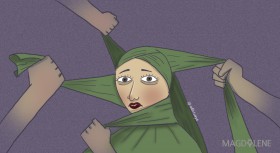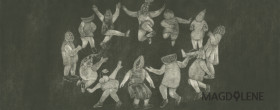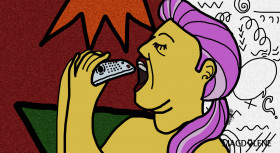Something’s amiss. Putri has been acting sad. She looks confused and agitated and there’s blood stain on her skirt, but when Adi asks her, she seems embarrassed. Later Adi recalls the story to his brother, but the answer baffles him even more.
“Putri may be menstruating,” his brother Fajar says.
“Menstruating—what is that?” Adi asks back.
Thus begins a conversation on menstruation
This scene comes from a comic booklet created by UNICEF Indonesia on menstrual hygiene management. About 30 pages long, it is double sided. On one side it tells the story of Putri’s first menstruation and is a guide on everything about menstruation, from the biological process and the psychological impact, how to use a sanitary pad, to common misconceptions.
The flip side of the booklet tells Adi’s story and contains information for boys about menstruation, describing it as a natural cycle experienced by every girl and woman (including their own mothers) and offering tips on how to support girls on their period.
“We made the 2-in-1 comic on purpose, hoping that the boys would peek at the girls’ side of the story, and vice versa,” said Reza Hendrawan, UNICEF Indonesia’s Water, Sanitation and Hygiene Specialist and the hygiene manager for the project.
In 2015 UNICEF Indonesia conducted a survey to find out what happens when girls get their period and how it affects their performance in school. The research found that one in seven girls skipped school while they were on their period to avoid thoughtless and rude comments from male classmates, particularly when the menstrual blood leaked on their uniform.
The comic book aims to educate boys about menstruation, so they become more sensitive and supportive of their female friends who are menstruation. It also addresses some of the common myths about what girls should or shouldn’t do during their period.
According to the research, 90 percent of girls who already have their period received information about menstruation from their parents. However, there are concerns that parents do not always provide valid information. It is common, for example, to find parents perpetuating myths, like girls who are on their period should not play sports, or wash their hair, or eat meat because their blood would smell. These misconceptions can harm the kids’ school performance.
Said UNICEF Indonesia’s Communication for Development Specialist Rizky Ika Syafitri: “Girls get lower score and missed sports and school activities because they skip school, thanks to misleading information, taboos and misconceptions surrounding menstruation. No one has really addressed this before, so we try to address it through the comic book.”
Before deciding on how to channel the information, UNICEF employed a participatory process involving kids to find the most effective approach.
“We are talking about kids’ issues, so it is only proper for us to ask them first: what is the best alternative solution to overcome this problem from their points of view,” Rizky said.
The UNICEF team met with about 100 boys and girls aged 10 to 14 and challenged them to formulate some ideas, which were then made into prototypes. The result showed that the kids tend to prefer communicative channels that are interactive, such as comic book and videos.
About 4,500 copies of the booklet have been distributed to primary schools and Madrasah Ibtidayah, which is elementary-level Islamic school, in urban and rural areas in Bandung, West Java, and Biak, Papua, and several other areas. In the near future, UNICEF plans to distribute the booklet to all 34 Indonesian provinces, working with the Ministry of Health. They have also received an endorsement from the Ministry of Education to use the comic book.
The results have been encouraging. After circulating the booklet to the students, UNICEF found that the percentage of boys who understand that menstrual cycle is normal and natural jumped from 61 percent to 89 percent, while boys who feel it is wrong to bully a girl on her period increased from 61 percent to 95 percent. Other results showed that after reading the comic, fewer girls feel that they have to keep their period a secret.
Asides from the comic book, UNICEF also created and produced an animation about menstruation targeted for high school students, specifically boys.
Access the indonesian version of the comic book, here.
Find out about this exhibition of young Indonesian illustrators and follow @bunnnicula on Twitter.









Comments